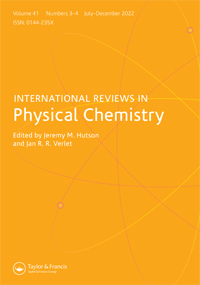三原子分子旋转振动谱的理论方法:与超球坐标比较的分布高斯函数
IF 2.5
2区 化学
Q3 CHEMISTRY, PHYSICAL
引用次数: 4
摘要
摘要采用基于分布高斯函数(DGF)和键长坐标的近似变分方法研究了不同三原子分子的旋转振动谱。此外,采用超球坐标和一组超球谐波构成了测试其性能的有效基准。这项工作描述了两种方法的技术细节,以提供相应的旋转振动状态的能量和对称性,并回顾了它们在三种不同系统中的应用:对于Ar和Ne, DGF技术表现出特别好的性能,但对于更高要求的场景,如H离子,观察到一些限制。文中还详细讨论了这些缺陷的可能原因。本文章由计算机程序翻译,如有差异,请以英文原文为准。
Theoretical methods for the rotation–vibration spectra of triatomic molecules: distributed Gaussian functions compared with hyperspherical coordinates
ABSTRACT An approximate variational method based in the use of distributed Gaussian functions (DGF) and bond-length coordinates has been applied to study the rotation–vibration spectra of different triatomic molecules. In addition, an approach which employs hyperspherical coordinates and a basis set of hyperspherical harmonics constitutes a valid benchmark to test its capabilities. This work describes the technical details of both methods to provide the energies and symmetry of the corresponding rovibrational states and reviews their application to three different systems: For Ar and Ne the DGF technique exhibits a particularly good performance, but some limitations are observed for a more demanding scenario such as the H ion. The possible origin of these deficiencies are also discussed in detail.
求助全文
通过发布文献求助,成功后即可免费获取论文全文。
去求助
来源期刊
CiteScore
14.20
自引率
1.60%
发文量
5
审稿时长
1 months
期刊介绍:
International Reviews in Physical Chemistry publishes review articles describing frontier research areas in physical chemistry. Internationally renowned scientists describe their own research in the wider context of the field. The articles are of interest not only to specialists but also to those wishing to read general and authoritative accounts of recent developments in physical chemistry, chemical physics and theoretical chemistry. The journal appeals to research workers, lecturers and research students alike.

 求助内容:
求助内容: 应助结果提醒方式:
应助结果提醒方式:


